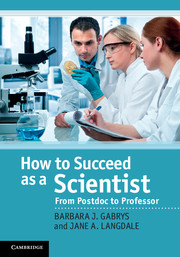Book contents
- Frontmatter
- Contents
- Preface
- Acknowledgements
- Part I Becoming an independent researcher
- 1 Managing your time
- 2 Giving a good research talk
- 3 Writing a quality research paper
- 4 Handling scientific criticism
- 5 Writing grant applications
- 6 Tools for managing research projects
- 7 Is there life beyond academia?
- 8 Applying for a job in academia
- 9 Applying for an independent research fellowship
- Part II Thriving in your new job
- Part III Managing your career
- Index
- References
5 - Writing grant applications
from Part I - Becoming an independent researcher
Published online by Cambridge University Press: 05 November 2011
- Frontmatter
- Contents
- Preface
- Acknowledgements
- Part I Becoming an independent researcher
- 1 Managing your time
- 2 Giving a good research talk
- 3 Writing a quality research paper
- 4 Handling scientific criticism
- 5 Writing grant applications
- 6 Tools for managing research projects
- 7 Is there life beyond academia?
- 8 Applying for a job in academia
- 9 Applying for an independent research fellowship
- Part II Thriving in your new job
- Part III Managing your career
- Index
- References
Summary
Have you ever heard anyone saying that they didn’t get their grant funded because the proposal wasn’t well written or because it was ill conceived? Probably not – but often it is the reason why funding is refused. This chapter outlines good practice for grant writing based on project management guidelines, and gives a blueprint for what makes a good application. An application for neutron beam time illustrates the points made. References are made to guidelines provided by major funding agencies.
The theory
Your life as a postdoc or an independent research fellow depends critically on obtaining grants from a funding body, such as the Research Councils in the UK, the National Science Foundation in the US, or the European Commission in Europe. Competition for this funding is fierce and, in order to secure money, you or your supervisor will have to submit a research proposal that will be judged by a panel of experts. Whether funds are awarded will depend greatly on how novel your proposal is (your vision), how well planned it is, and how cost effective it is. To succeed, at least in the short term, your novel idea must fit within a certain funding stream and must be viewed positively by your peers. Whilst it is recognised that there are risks inherent to every project, these risks have to be identified and managed appropriately. Furthermore, as the funding agencies are publicly accountable for the grants they give out, you will need to justify how you intend to spend their money.
Before getting carried away and spending a lot of time writing and developing your ideas, you should check your eligibility to apply for a particular award. Depending on your official status, different options will be open to you. For example, if you are on your first postdoc, you can apply for a variety of personal fellowships or for conference travel funds, but would not normally be eligible to act as a principal investigator on a multi-million pound research programme. At the end of this chapter, we list links to various funding agencies and schemes.
Information
- Type
- Chapter
- Information
- How to Succeed as a ScientistFrom Postdoc to Professor, pp. 45 - 57Publisher: Cambridge University PressPrint publication year: 2011
